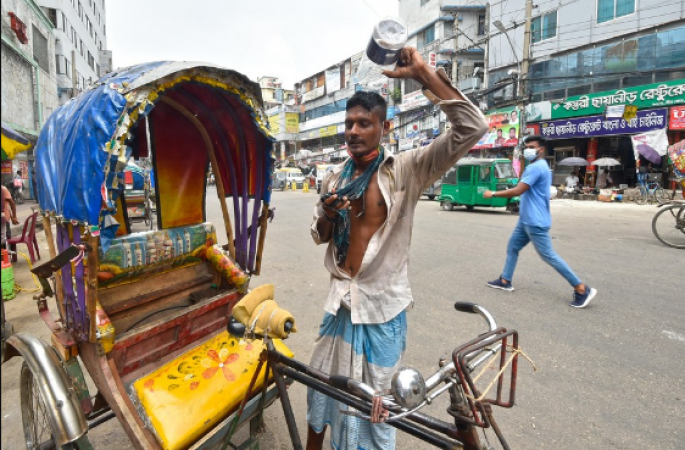
Dhaka: Bangladeshis' health and food security are in jeopardy due to record high temperatures as their already climate-vulnerable nation is engulfed in a severe heatwave that is sweeping parts of Asia.
Residents have been suffering from the heat since the beginning of the month in the majority of the region. Although April is usually one of the warmest months, this year's heat in South and Southeast Asia is unusual.
The highest temperature in sixty years was recorded on April 16 in Dhaka, the capital of Bangladesh. With global warming, it is likely that the record-breaking trend will continue.
Also Read: Nepal's PM's visit to India deferred till June, Here's how
"We can't guarantee that this heatwave won't happen again... The frequency of heatwaves will rise as a result of climate change, according to Azizur Rahman, director of the Bangladesh Meteorological Department, who spoke to Arab News over the weekend when Dhaka's temperature was about 37 degrees Celsius, or about 4 degrees higher than it was during the same time last year.
Also Read: Surprising! Mother got her own daughter raped, soul will tremble after knowing the matter
"The highest temperature recorded in Dhaka was 40.2 degrees Celsius in 1965; in 2014, it was 40.3. The highest temperature this year was 40.6 degrees.
Rahman explained that the recent heat wave lasted longer than usual. It lasted roughly 16 days, from April 4 to April 20, and it was. It was highly peculiar. According to Rahman, heatwaves typically occur at regular intervals and another one was probably on the horizon.
Due to the "heat island" effect, in which iron and concrete infrastructure amplifies the heat, Dhaka, a sprawling city of more than 20 million people, has been particularly hard hit.
Bangladeshis are already feeling the effects of the extreme weather, with cases of heat exhaustion and heat stroke rising and outbreaks of other diseases on the horizon.
"We have heard of more cases of heat stroke this year compared to last year," Rahman said. "During heatwaves, cholera and diarrhoea also spread."
Concerns about this year's crops and food security are already growing in the midst of the extended heat wave and lack of rain.
According to Prof. M. A. Rahim of Daffodil University in Dhaka, "Different seasonal fruits can't grow to maturity," as the heat breaks the attachment of unripe fruits to the plant and prevents pollination of the flowers of other fruit plants by bees and other insects.
Also Read: India’s ties with China ABNORMAL as Beijing violates Border Pacts: EAM Jaishankar
The heat makes it impossible for paddy to grow and for farmers to work, endangering the nation's rice harvest. Rahim stated that the production of rice, which is a staple food, is being impacted by the heatwave and that this could result in a 40 percent decrease in rice production. The germination process, which has a significant impact on food production, is also being negatively impacted by this warm temperature. This heat wave is having a variety of effects on our food security.